Chinese Civilization and Society: A Historical Overview
VerifiedAdded on 2023/06/10
|13
|3076
|400
AI Summary
This paper provides an overview of the rich history of Chinese civilization and society. It discusses the formation of Chinese society, its geographical perspectives, culture, origin, foreign relations, and more. The paper also explores the impact of foreign domination and the spread of Christianity on China.
Contribute Materials
Your contribution can guide someone’s learning journey. Share your
documents today.
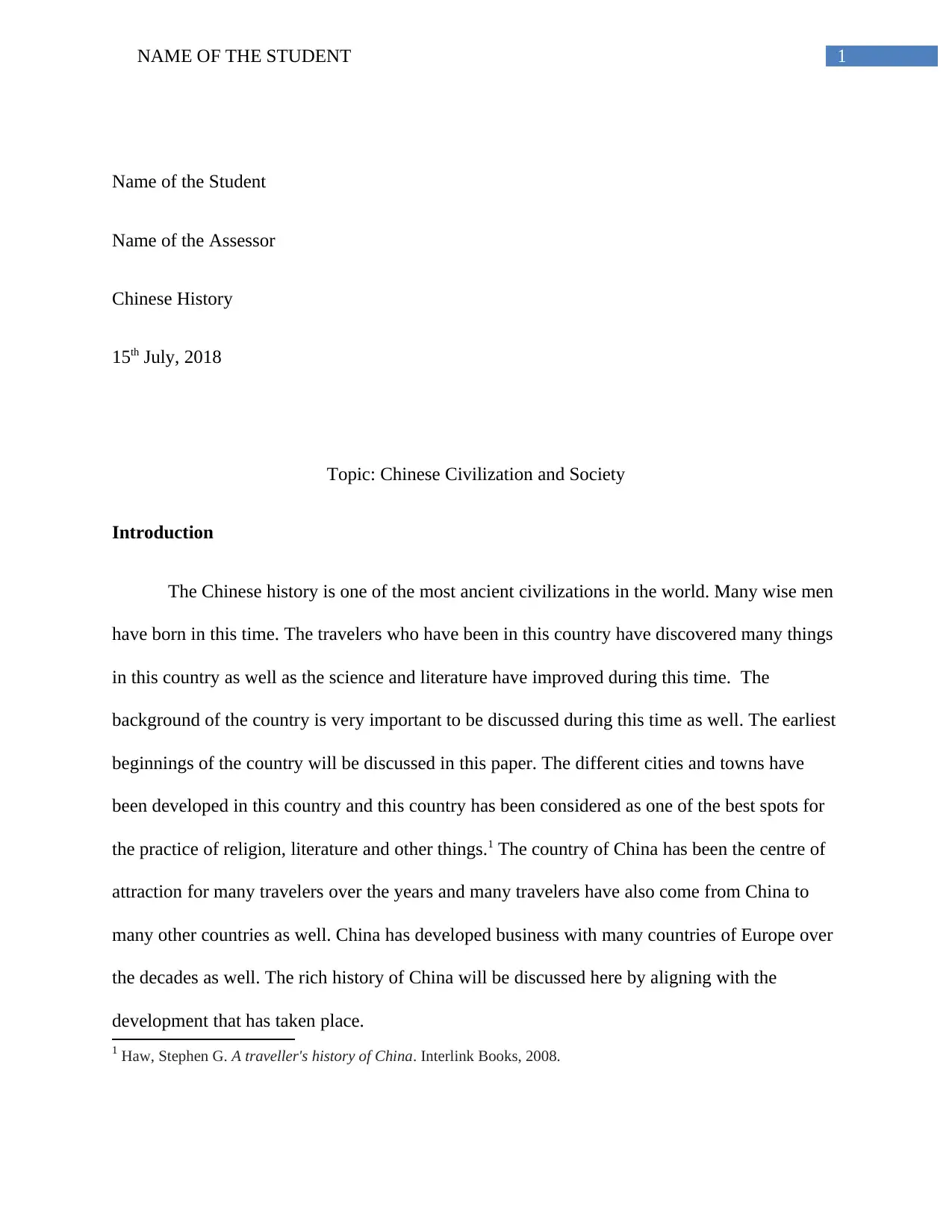
1NAME OF THE STUDENT
Name of the Student
Name of the Assessor
Chinese History
15th July, 2018
Topic: Chinese Civilization and Society
Introduction
The Chinese history is one of the most ancient civilizations in the world. Many wise men
have born in this time. The travelers who have been in this country have discovered many things
in this country as well as the science and literature have improved during this time. The
background of the country is very important to be discussed during this time as well. The earliest
beginnings of the country will be discussed in this paper. The different cities and towns have
been developed in this country and this country has been considered as one of the best spots for
the practice of religion, literature and other things.1 The country of China has been the centre of
attraction for many travelers over the years and many travelers have also come from China to
many other countries as well. China has developed business with many countries of Europe over
the decades as well. The rich history of China will be discussed here by aligning with the
development that has taken place.
1 Haw, Stephen G. A traveller's history of China. Interlink Books, 2008.
Name of the Student
Name of the Assessor
Chinese History
15th July, 2018
Topic: Chinese Civilization and Society
Introduction
The Chinese history is one of the most ancient civilizations in the world. Many wise men
have born in this time. The travelers who have been in this country have discovered many things
in this country as well as the science and literature have improved during this time. The
background of the country is very important to be discussed during this time as well. The earliest
beginnings of the country will be discussed in this paper. The different cities and towns have
been developed in this country and this country has been considered as one of the best spots for
the practice of religion, literature and other things.1 The country of China has been the centre of
attraction for many travelers over the years and many travelers have also come from China to
many other countries as well. China has developed business with many countries of Europe over
the decades as well. The rich history of China will be discussed here by aligning with the
development that has taken place.
1 Haw, Stephen G. A traveller's history of China. Interlink Books, 2008.
Secure Best Marks with AI Grader
Need help grading? Try our AI Grader for instant feedback on your assignments.
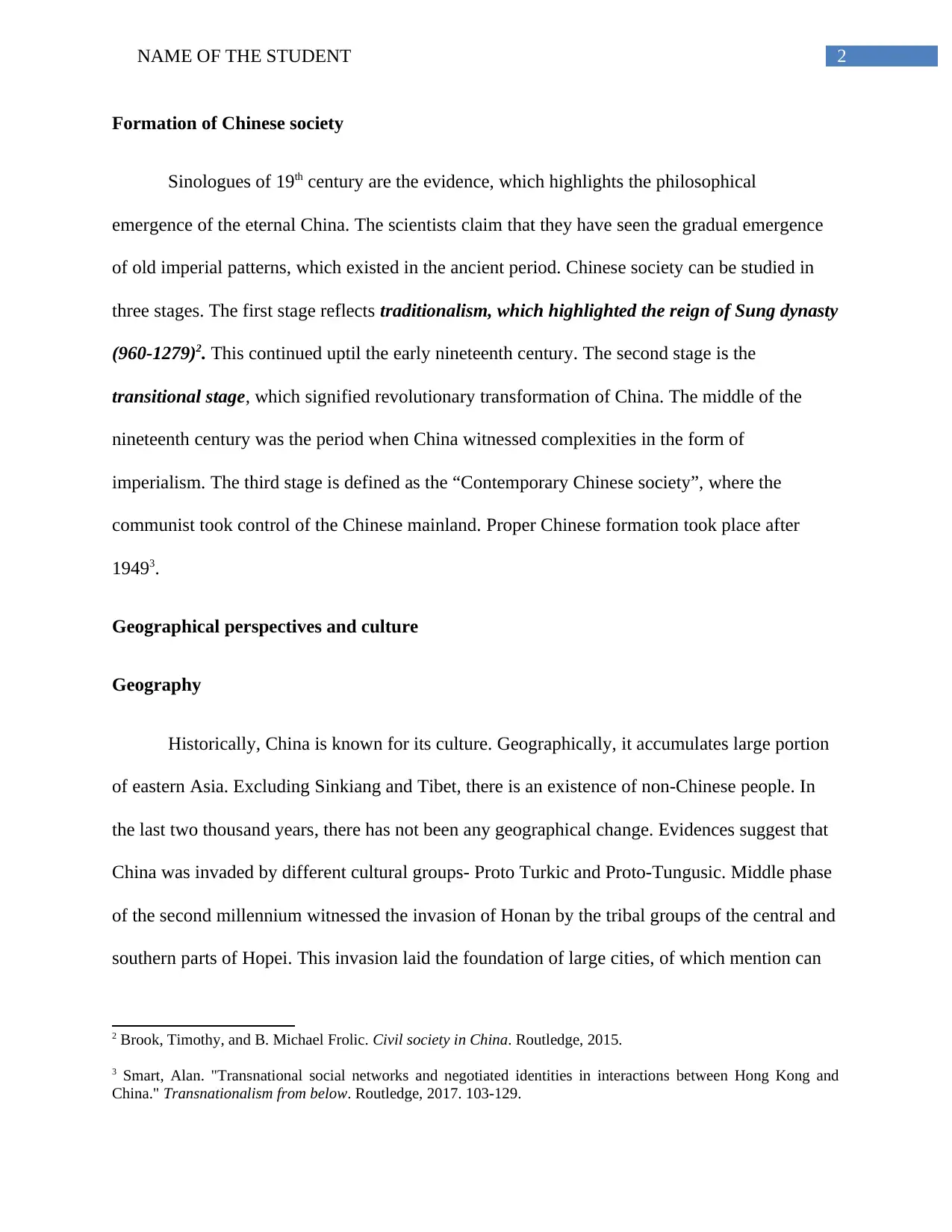
2NAME OF THE STUDENT
Formation of Chinese society
Sinologues of 19th century are the evidence, which highlights the philosophical
emergence of the eternal China. The scientists claim that they have seen the gradual emergence
of old imperial patterns, which existed in the ancient period. Chinese society can be studied in
three stages. The first stage reflects traditionalism, which highlighted the reign of Sung dynasty
(960-1279)2. This continued uptil the early nineteenth century. The second stage is the
transitional stage, which signified revolutionary transformation of China. The middle of the
nineteenth century was the period when China witnessed complexities in the form of
imperialism. The third stage is defined as the “Contemporary Chinese society”, where the
communist took control of the Chinese mainland. Proper Chinese formation took place after
19493.
Geographical perspectives and culture
Geography
Historically, China is known for its culture. Geographically, it accumulates large portion
of eastern Asia. Excluding Sinkiang and Tibet, there is an existence of non-Chinese people. In
the last two thousand years, there has not been any geographical change. Evidences suggest that
China was invaded by different cultural groups- Proto Turkic and Proto-Tungusic. Middle phase
of the second millennium witnessed the invasion of Honan by the tribal groups of the central and
southern parts of Hopei. This invasion laid the foundation of large cities, of which mention can
2 Brook, Timothy, and B. Michael Frolic. Civil society in China. Routledge, 2015.
3 Smart, Alan. "Transnational social networks and negotiated identities in interactions between Hong Kong and
China." Transnationalism from below. Routledge, 2017. 103-129.
Formation of Chinese society
Sinologues of 19th century are the evidence, which highlights the philosophical
emergence of the eternal China. The scientists claim that they have seen the gradual emergence
of old imperial patterns, which existed in the ancient period. Chinese society can be studied in
three stages. The first stage reflects traditionalism, which highlighted the reign of Sung dynasty
(960-1279)2. This continued uptil the early nineteenth century. The second stage is the
transitional stage, which signified revolutionary transformation of China. The middle of the
nineteenth century was the period when China witnessed complexities in the form of
imperialism. The third stage is defined as the “Contemporary Chinese society”, where the
communist took control of the Chinese mainland. Proper Chinese formation took place after
19493.
Geographical perspectives and culture
Geography
Historically, China is known for its culture. Geographically, it accumulates large portion
of eastern Asia. Excluding Sinkiang and Tibet, there is an existence of non-Chinese people. In
the last two thousand years, there has not been any geographical change. Evidences suggest that
China was invaded by different cultural groups- Proto Turkic and Proto-Tungusic. Middle phase
of the second millennium witnessed the invasion of Honan by the tribal groups of the central and
southern parts of Hopei. This invasion laid the foundation of large cities, of which mention can
2 Brook, Timothy, and B. Michael Frolic. Civil society in China. Routledge, 2015.
3 Smart, Alan. "Transnational social networks and negotiated identities in interactions between Hong Kong and
China." Transnationalism from below. Routledge, 2017. 103-129.
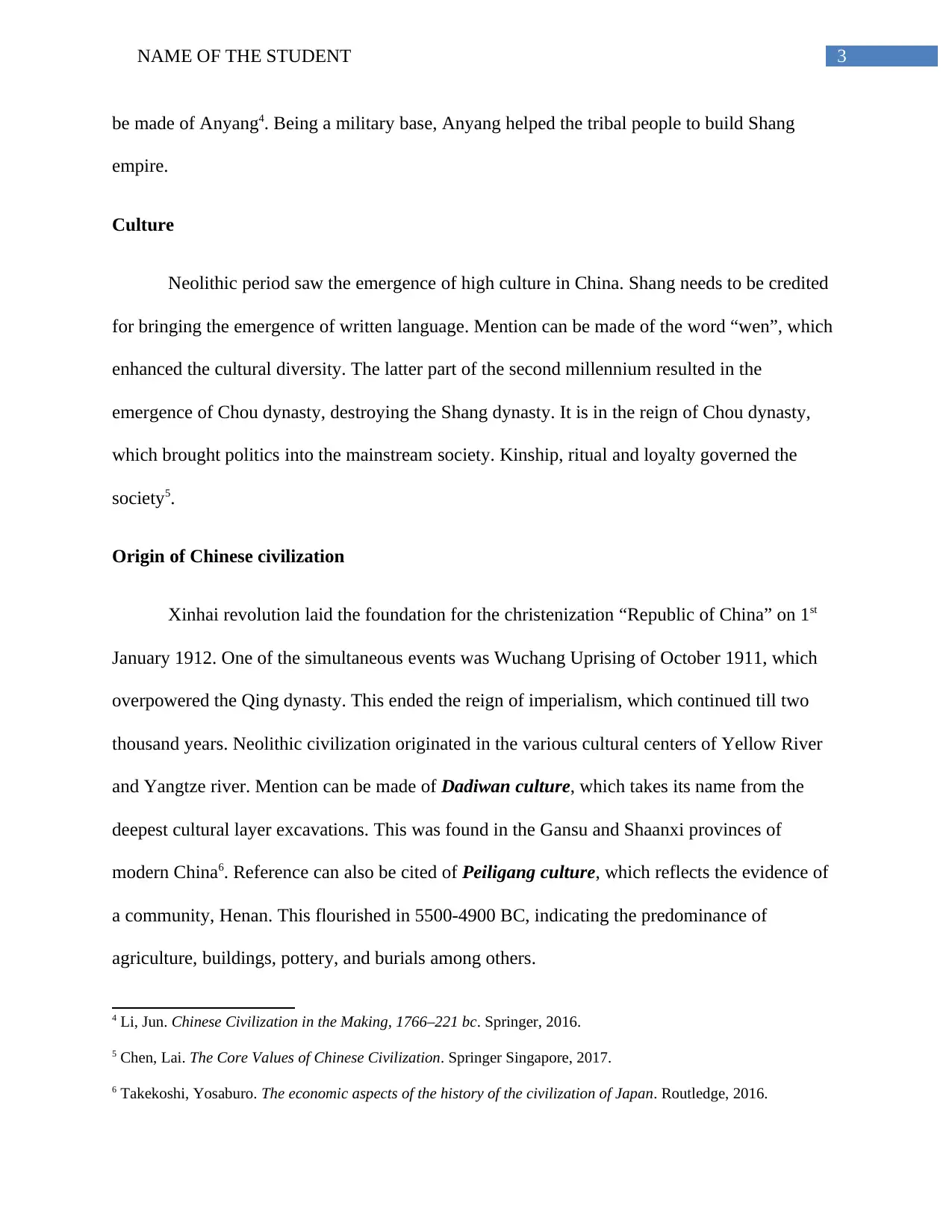
3NAME OF THE STUDENT
be made of Anyang4. Being a military base, Anyang helped the tribal people to build Shang
empire.
Culture
Neolithic period saw the emergence of high culture in China. Shang needs to be credited
for bringing the emergence of written language. Mention can be made of the word “wen”, which
enhanced the cultural diversity. The latter part of the second millennium resulted in the
emergence of Chou dynasty, destroying the Shang dynasty. It is in the reign of Chou dynasty,
which brought politics into the mainstream society. Kinship, ritual and loyalty governed the
society5.
Origin of Chinese civilization
Xinhai revolution laid the foundation for the christenization “Republic of China” on 1st
January 1912. One of the simultaneous events was Wuchang Uprising of October 1911, which
overpowered the Qing dynasty. This ended the reign of imperialism, which continued till two
thousand years. Neolithic civilization originated in the various cultural centers of Yellow River
and Yangtze river. Mention can be made of Dadiwan culture, which takes its name from the
deepest cultural layer excavations. This was found in the Gansu and Shaanxi provinces of
modern China6. Reference can also be cited of Peiligang culture, which reflects the evidence of
a community, Henan. This flourished in 5500-4900 BC, indicating the predominance of
agriculture, buildings, pottery, and burials among others.
4 Li, Jun. Chinese Civilization in the Making, 1766–221 bc. Springer, 2016.
5 Chen, Lai. The Core Values of Chinese Civilization. Springer Singapore, 2017.
6 Takekoshi, Yosaburo. The economic aspects of the history of the civilization of Japan. Routledge, 2016.
be made of Anyang4. Being a military base, Anyang helped the tribal people to build Shang
empire.
Culture
Neolithic period saw the emergence of high culture in China. Shang needs to be credited
for bringing the emergence of written language. Mention can be made of the word “wen”, which
enhanced the cultural diversity. The latter part of the second millennium resulted in the
emergence of Chou dynasty, destroying the Shang dynasty. It is in the reign of Chou dynasty,
which brought politics into the mainstream society. Kinship, ritual and loyalty governed the
society5.
Origin of Chinese civilization
Xinhai revolution laid the foundation for the christenization “Republic of China” on 1st
January 1912. One of the simultaneous events was Wuchang Uprising of October 1911, which
overpowered the Qing dynasty. This ended the reign of imperialism, which continued till two
thousand years. Neolithic civilization originated in the various cultural centers of Yellow River
and Yangtze river. Mention can be made of Dadiwan culture, which takes its name from the
deepest cultural layer excavations. This was found in the Gansu and Shaanxi provinces of
modern China6. Reference can also be cited of Peiligang culture, which reflects the evidence of
a community, Henan. This flourished in 5500-4900 BC, indicating the predominance of
agriculture, buildings, pottery, and burials among others.
4 Li, Jun. Chinese Civilization in the Making, 1766–221 bc. Springer, 2016.
5 Chen, Lai. The Core Values of Chinese Civilization. Springer Singapore, 2017.
6 Takekoshi, Yosaburo. The economic aspects of the history of the civilization of Japan. Routledge, 2016.
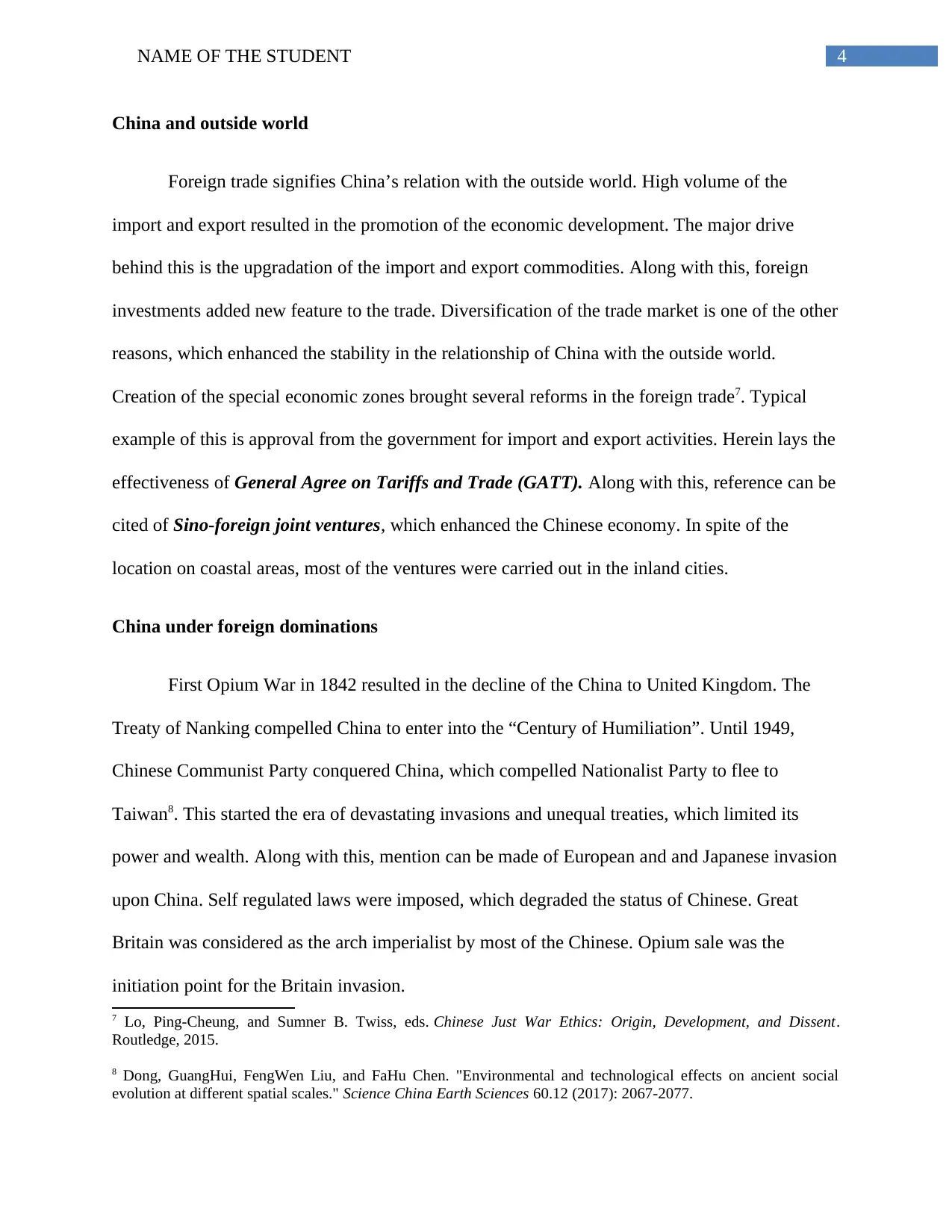
4NAME OF THE STUDENT
China and outside world
Foreign trade signifies China’s relation with the outside world. High volume of the
import and export resulted in the promotion of the economic development. The major drive
behind this is the upgradation of the import and export commodities. Along with this, foreign
investments added new feature to the trade. Diversification of the trade market is one of the other
reasons, which enhanced the stability in the relationship of China with the outside world.
Creation of the special economic zones brought several reforms in the foreign trade7. Typical
example of this is approval from the government for import and export activities. Herein lays the
effectiveness of General Agree on Tariffs and Trade (GATT). Along with this, reference can be
cited of Sino-foreign joint ventures, which enhanced the Chinese economy. In spite of the
location on coastal areas, most of the ventures were carried out in the inland cities.
China under foreign dominations
First Opium War in 1842 resulted in the decline of the China to United Kingdom. The
Treaty of Nanking compelled China to enter into the “Century of Humiliation”. Until 1949,
Chinese Communist Party conquered China, which compelled Nationalist Party to flee to
Taiwan8. This started the era of devastating invasions and unequal treaties, which limited its
power and wealth. Along with this, mention can be made of European and and Japanese invasion
upon China. Self regulated laws were imposed, which degraded the status of Chinese. Great
Britain was considered as the arch imperialist by most of the Chinese. Opium sale was the
initiation point for the Britain invasion.
7 Lo, Ping-Cheung, and Sumner B. Twiss, eds. Chinese Just War Ethics: Origin, Development, and Dissent.
Routledge, 2015.
8 Dong, GuangHui, FengWen Liu, and FaHu Chen. "Environmental and technological effects on ancient social
evolution at different spatial scales." Science China Earth Sciences 60.12 (2017): 2067-2077.
China and outside world
Foreign trade signifies China’s relation with the outside world. High volume of the
import and export resulted in the promotion of the economic development. The major drive
behind this is the upgradation of the import and export commodities. Along with this, foreign
investments added new feature to the trade. Diversification of the trade market is one of the other
reasons, which enhanced the stability in the relationship of China with the outside world.
Creation of the special economic zones brought several reforms in the foreign trade7. Typical
example of this is approval from the government for import and export activities. Herein lays the
effectiveness of General Agree on Tariffs and Trade (GATT). Along with this, reference can be
cited of Sino-foreign joint ventures, which enhanced the Chinese economy. In spite of the
location on coastal areas, most of the ventures were carried out in the inland cities.
China under foreign dominations
First Opium War in 1842 resulted in the decline of the China to United Kingdom. The
Treaty of Nanking compelled China to enter into the “Century of Humiliation”. Until 1949,
Chinese Communist Party conquered China, which compelled Nationalist Party to flee to
Taiwan8. This started the era of devastating invasions and unequal treaties, which limited its
power and wealth. Along with this, mention can be made of European and and Japanese invasion
upon China. Self regulated laws were imposed, which degraded the status of Chinese. Great
Britain was considered as the arch imperialist by most of the Chinese. Opium sale was the
initiation point for the Britain invasion.
7 Lo, Ping-Cheung, and Sumner B. Twiss, eds. Chinese Just War Ethics: Origin, Development, and Dissent.
Routledge, 2015.
8 Dong, GuangHui, FengWen Liu, and FaHu Chen. "Environmental and technological effects on ancient social
evolution at different spatial scales." Science China Earth Sciences 60.12 (2017): 2067-2077.
Secure Best Marks with AI Grader
Need help grading? Try our AI Grader for instant feedback on your assignments.
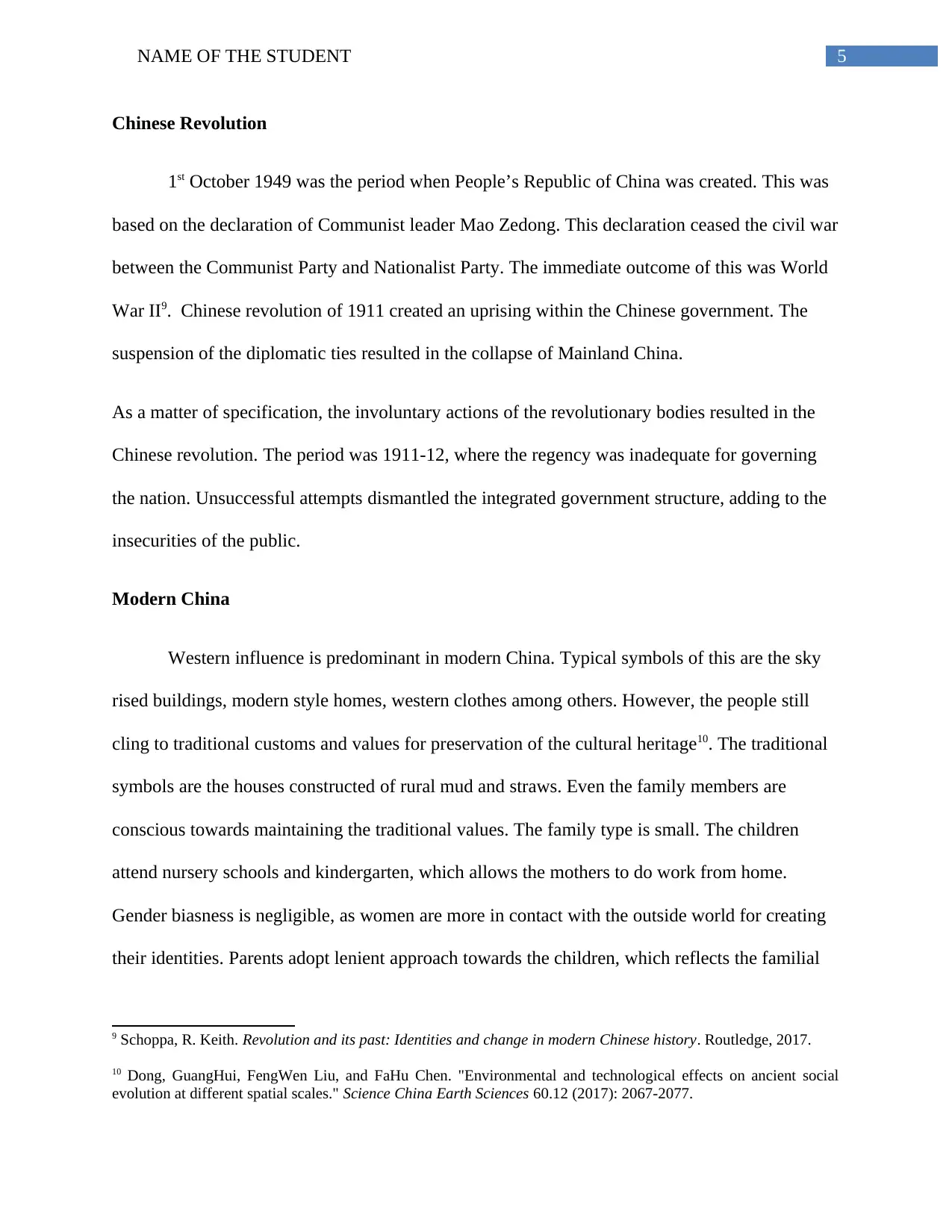
5NAME OF THE STUDENT
Chinese Revolution
1st October 1949 was the period when People’s Republic of China was created. This was
based on the declaration of Communist leader Mao Zedong. This declaration ceased the civil war
between the Communist Party and Nationalist Party. The immediate outcome of this was World
War II9. Chinese revolution of 1911 created an uprising within the Chinese government. The
suspension of the diplomatic ties resulted in the collapse of Mainland China.
As a matter of specification, the involuntary actions of the revolutionary bodies resulted in the
Chinese revolution. The period was 1911-12, where the regency was inadequate for governing
the nation. Unsuccessful attempts dismantled the integrated government structure, adding to the
insecurities of the public.
Modern China
Western influence is predominant in modern China. Typical symbols of this are the sky
rised buildings, modern style homes, western clothes among others. However, the people still
cling to traditional customs and values for preservation of the cultural heritage10. The traditional
symbols are the houses constructed of rural mud and straws. Even the family members are
conscious towards maintaining the traditional values. The family type is small. The children
attend nursery schools and kindergarten, which allows the mothers to do work from home.
Gender biasness is negligible, as women are more in contact with the outside world for creating
their identities. Parents adopt lenient approach towards the children, which reflects the familial
9 Schoppa, R. Keith. Revolution and its past: Identities and change in modern Chinese history. Routledge, 2017.
10 Dong, GuangHui, FengWen Liu, and FaHu Chen. "Environmental and technological effects on ancient social
evolution at different spatial scales." Science China Earth Sciences 60.12 (2017): 2067-2077.
Chinese Revolution
1st October 1949 was the period when People’s Republic of China was created. This was
based on the declaration of Communist leader Mao Zedong. This declaration ceased the civil war
between the Communist Party and Nationalist Party. The immediate outcome of this was World
War II9. Chinese revolution of 1911 created an uprising within the Chinese government. The
suspension of the diplomatic ties resulted in the collapse of Mainland China.
As a matter of specification, the involuntary actions of the revolutionary bodies resulted in the
Chinese revolution. The period was 1911-12, where the regency was inadequate for governing
the nation. Unsuccessful attempts dismantled the integrated government structure, adding to the
insecurities of the public.
Modern China
Western influence is predominant in modern China. Typical symbols of this are the sky
rised buildings, modern style homes, western clothes among others. However, the people still
cling to traditional customs and values for preservation of the cultural heritage10. The traditional
symbols are the houses constructed of rural mud and straws. Even the family members are
conscious towards maintaining the traditional values. The family type is small. The children
attend nursery schools and kindergarten, which allows the mothers to do work from home.
Gender biasness is negligible, as women are more in contact with the outside world for creating
their identities. Parents adopt lenient approach towards the children, which reflects the familial
9 Schoppa, R. Keith. Revolution and its past: Identities and change in modern Chinese history. Routledge, 2017.
10 Dong, GuangHui, FengWen Liu, and FaHu Chen. "Environmental and technological effects on ancient social
evolution at different spatial scales." Science China Earth Sciences 60.12 (2017): 2067-2077.
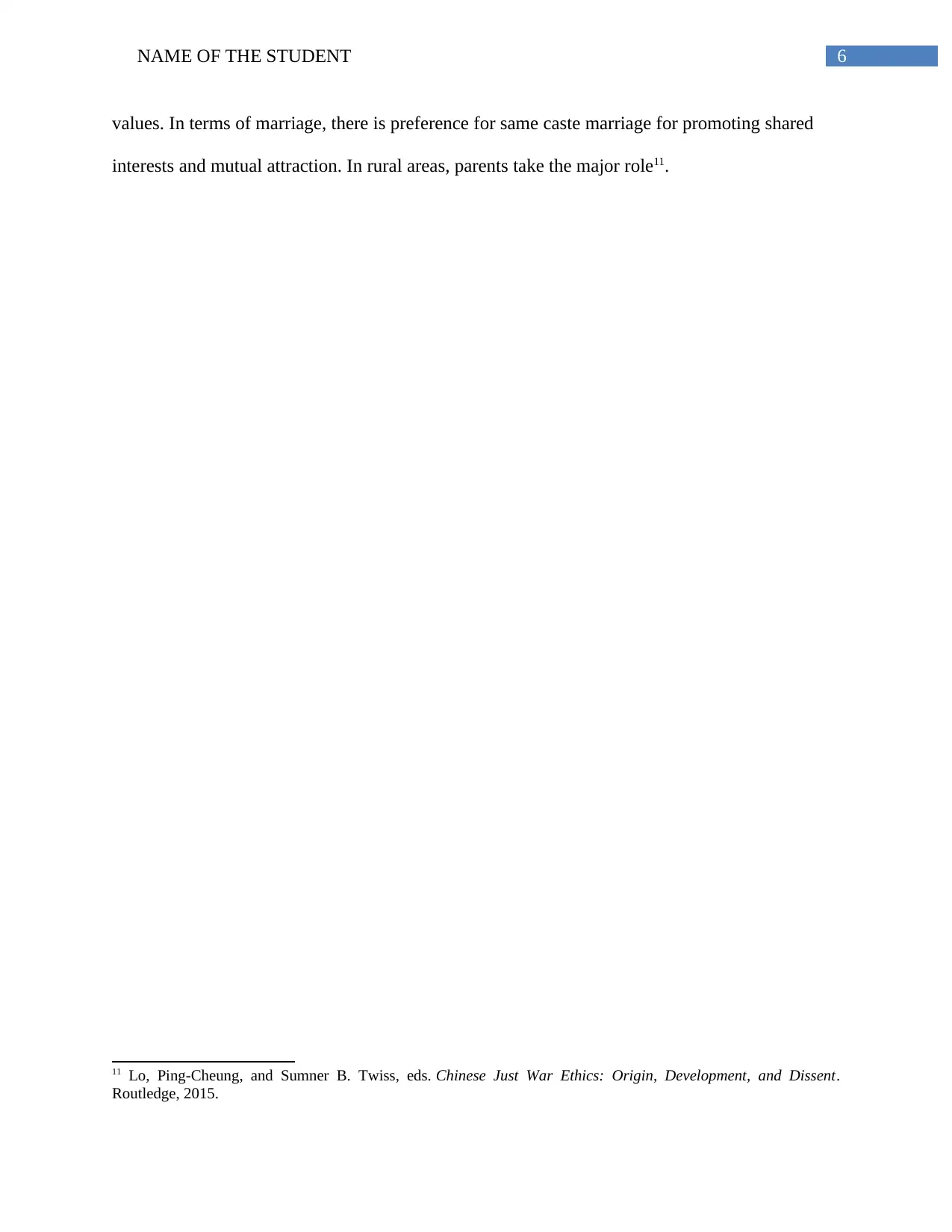
6NAME OF THE STUDENT
values. In terms of marriage, there is preference for same caste marriage for promoting shared
interests and mutual attraction. In rural areas, parents take the major role11.
11 Lo, Ping-Cheung, and Sumner B. Twiss, eds. Chinese Just War Ethics: Origin, Development, and Dissent.
Routledge, 2015.
values. In terms of marriage, there is preference for same caste marriage for promoting shared
interests and mutual attraction. In rural areas, parents take the major role11.
11 Lo, Ping-Cheung, and Sumner B. Twiss, eds. Chinese Just War Ethics: Origin, Development, and Dissent.
Routledge, 2015.
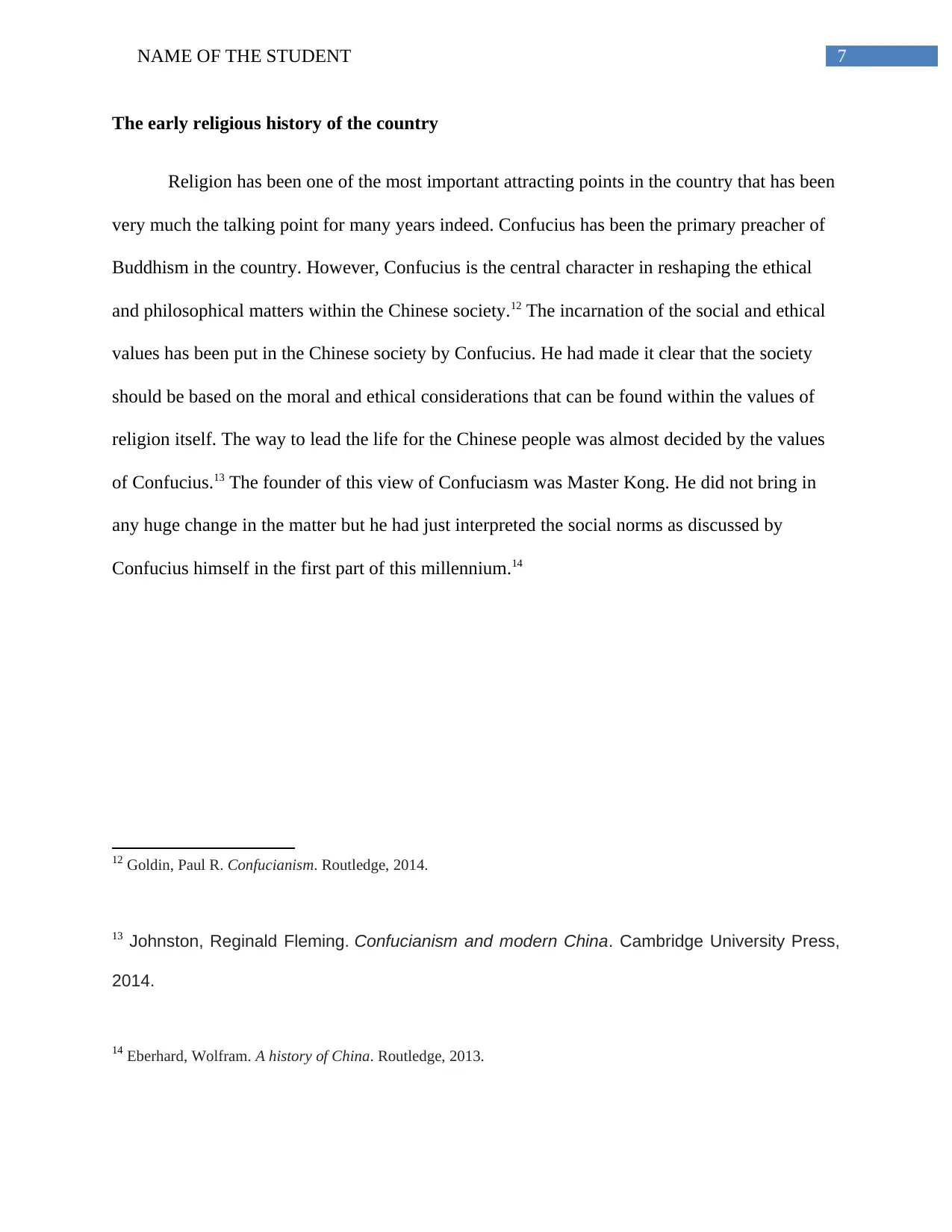
7NAME OF THE STUDENT
The early religious history of the country
Religion has been one of the most important attracting points in the country that has been
very much the talking point for many years indeed. Confucius has been the primary preacher of
Buddhism in the country. However, Confucius is the central character in reshaping the ethical
and philosophical matters within the Chinese society.12 The incarnation of the social and ethical
values has been put in the Chinese society by Confucius. He had made it clear that the society
should be based on the moral and ethical considerations that can be found within the values of
religion itself. The way to lead the life for the Chinese people was almost decided by the values
of Confucius.13 The founder of this view of Confuciasm was Master Kong. He did not bring in
any huge change in the matter but he had just interpreted the social norms as discussed by
Confucius himself in the first part of this millennium.14
12 Goldin, Paul R. Confucianism. Routledge, 2014.
13 Johnston, Reginald Fleming. Confucianism and modern China. Cambridge University Press,
2014.
14 Eberhard, Wolfram. A history of China. Routledge, 2013.
The early religious history of the country
Religion has been one of the most important attracting points in the country that has been
very much the talking point for many years indeed. Confucius has been the primary preacher of
Buddhism in the country. However, Confucius is the central character in reshaping the ethical
and philosophical matters within the Chinese society.12 The incarnation of the social and ethical
values has been put in the Chinese society by Confucius. He had made it clear that the society
should be based on the moral and ethical considerations that can be found within the values of
religion itself. The way to lead the life for the Chinese people was almost decided by the values
of Confucius.13 The founder of this view of Confuciasm was Master Kong. He did not bring in
any huge change in the matter but he had just interpreted the social norms as discussed by
Confucius himself in the first part of this millennium.14
12 Goldin, Paul R. Confucianism. Routledge, 2014.
13 Johnston, Reginald Fleming. Confucianism and modern China. Cambridge University Press,
2014.
14 Eberhard, Wolfram. A history of China. Routledge, 2013.
Paraphrase This Document
Need a fresh take? Get an instant paraphrase of this document with our AI Paraphraser
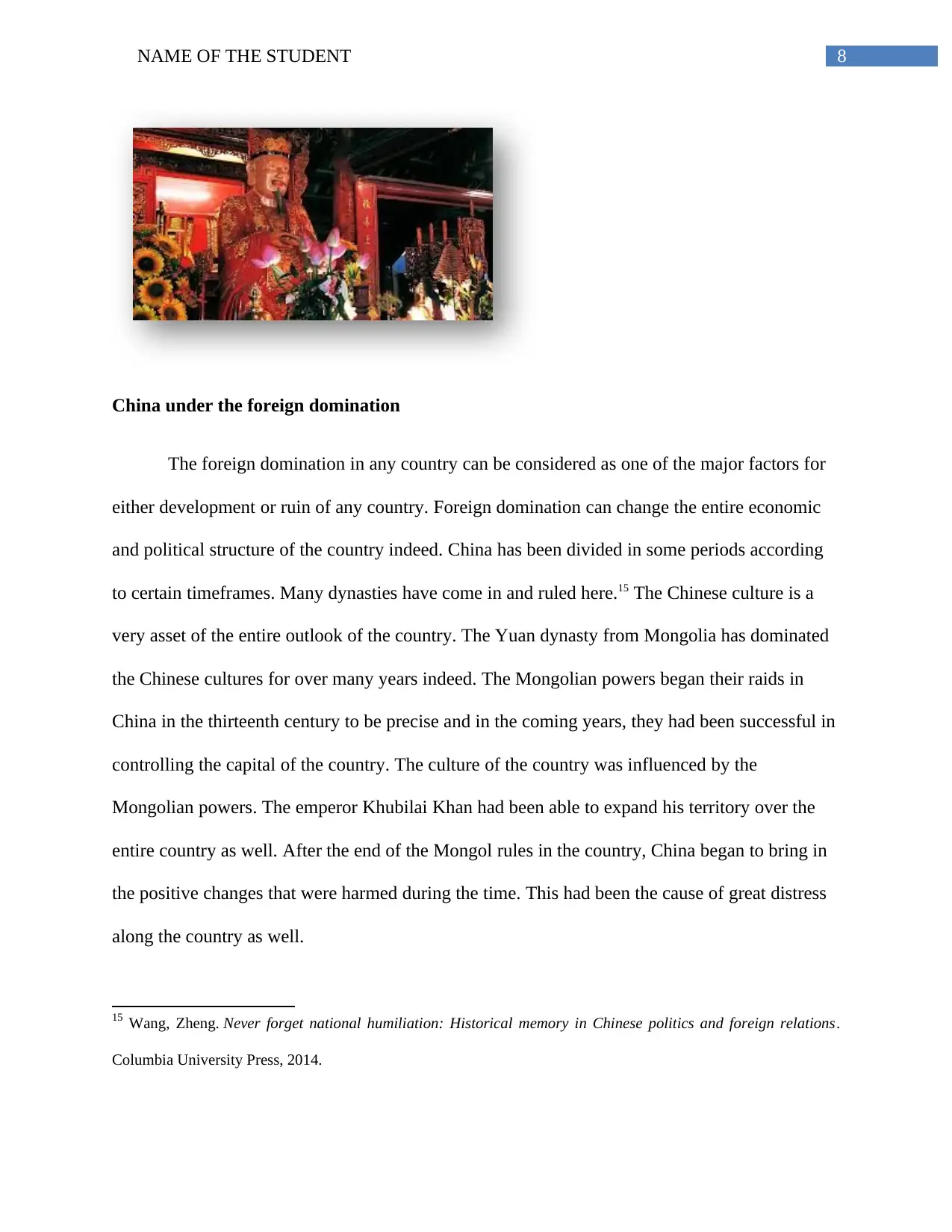
8NAME OF THE STUDENT
China under the foreign domination
The foreign domination in any country can be considered as one of the major factors for
either development or ruin of any country. Foreign domination can change the entire economic
and political structure of the country indeed. China has been divided in some periods according
to certain timeframes. Many dynasties have come in and ruled here.15 The Chinese culture is a
very asset of the entire outlook of the country. The Yuan dynasty from Mongolia has dominated
the Chinese cultures for over many years indeed. The Mongolian powers began their raids in
China in the thirteenth century to be precise and in the coming years, they had been successful in
controlling the capital of the country. The culture of the country was influenced by the
Mongolian powers. The emperor Khubilai Khan had been able to expand his territory over the
entire country as well. After the end of the Mongol rules in the country, China began to bring in
the positive changes that were harmed during the time. This had been the cause of great distress
along the country as well.
15 Wang, Zheng. Never forget national humiliation: Historical memory in Chinese politics and foreign relations.
Columbia University Press, 2014.
China under the foreign domination
The foreign domination in any country can be considered as one of the major factors for
either development or ruin of any country. Foreign domination can change the entire economic
and political structure of the country indeed. China has been divided in some periods according
to certain timeframes. Many dynasties have come in and ruled here.15 The Chinese culture is a
very asset of the entire outlook of the country. The Yuan dynasty from Mongolia has dominated
the Chinese cultures for over many years indeed. The Mongolian powers began their raids in
China in the thirteenth century to be precise and in the coming years, they had been successful in
controlling the capital of the country. The culture of the country was influenced by the
Mongolian powers. The emperor Khubilai Khan had been able to expand his territory over the
entire country as well. After the end of the Mongol rules in the country, China began to bring in
the positive changes that were harmed during the time. This had been the cause of great distress
along the country as well.
15 Wang, Zheng. Never forget national humiliation: Historical memory in Chinese politics and foreign relations.
Columbia University Press, 2014.
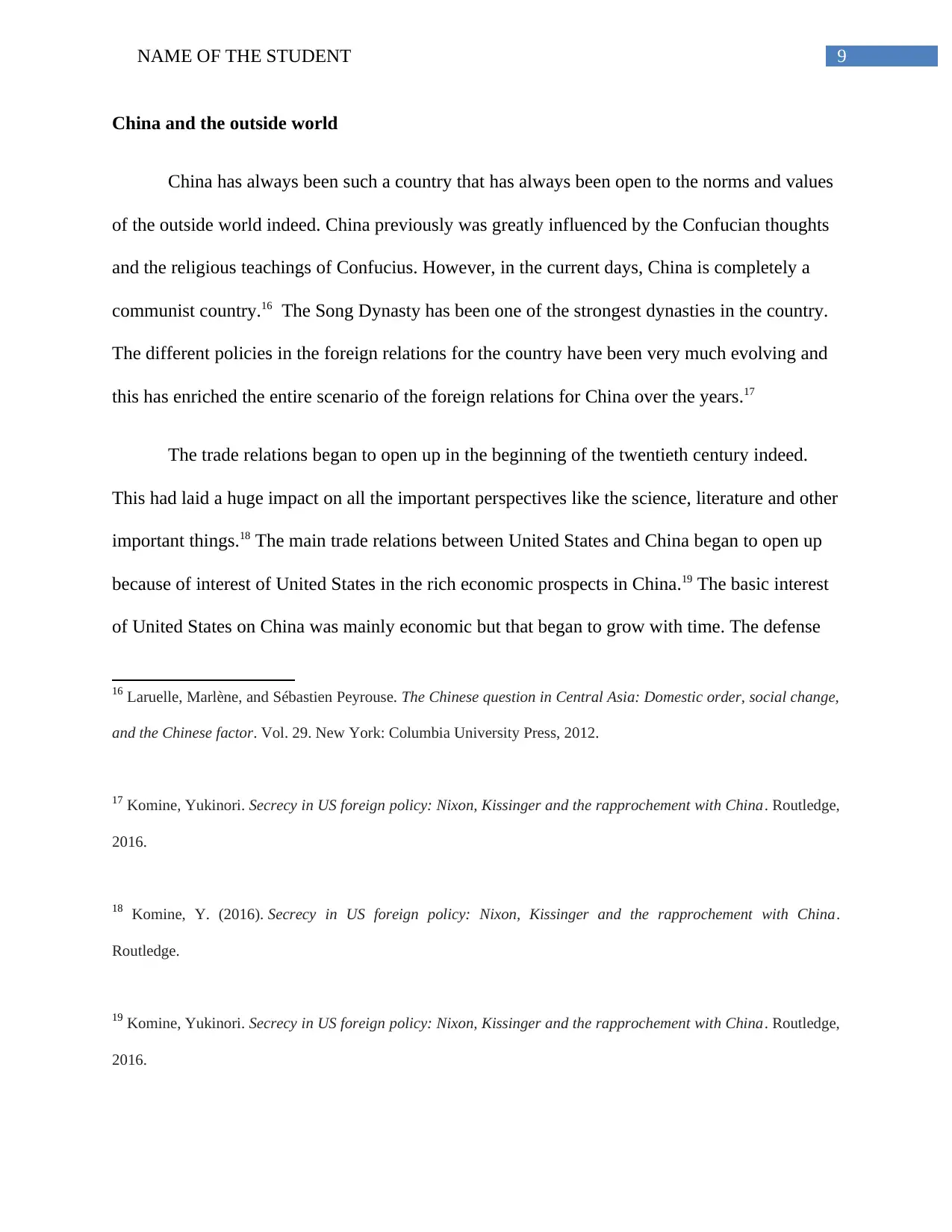
9NAME OF THE STUDENT
China and the outside world
China has always been such a country that has always been open to the norms and values
of the outside world indeed. China previously was greatly influenced by the Confucian thoughts
and the religious teachings of Confucius. However, in the current days, China is completely a
communist country.16 The Song Dynasty has been one of the strongest dynasties in the country.
The different policies in the foreign relations for the country have been very much evolving and
this has enriched the entire scenario of the foreign relations for China over the years.17
The trade relations began to open up in the beginning of the twentieth century indeed.
This had laid a huge impact on all the important perspectives like the science, literature and other
important things.18 The main trade relations between United States and China began to open up
because of interest of United States in the rich economic prospects in China.19 The basic interest
of United States on China was mainly economic but that began to grow with time. The defense
16 Laruelle, Marlène, and Sébastien Peyrouse. The Chinese question in Central Asia: Domestic order, social change,
and the Chinese factor. Vol. 29. New York: Columbia University Press, 2012.
17 Komine, Yukinori. Secrecy in US foreign policy: Nixon, Kissinger and the rapprochement with China. Routledge,
2016.
18 Komine, Y. (2016). Secrecy in US foreign policy: Nixon, Kissinger and the rapprochement with China.
Routledge.
19 Komine, Yukinori. Secrecy in US foreign policy: Nixon, Kissinger and the rapprochement with China. Routledge,
2016.
China and the outside world
China has always been such a country that has always been open to the norms and values
of the outside world indeed. China previously was greatly influenced by the Confucian thoughts
and the religious teachings of Confucius. However, in the current days, China is completely a
communist country.16 The Song Dynasty has been one of the strongest dynasties in the country.
The different policies in the foreign relations for the country have been very much evolving and
this has enriched the entire scenario of the foreign relations for China over the years.17
The trade relations began to open up in the beginning of the twentieth century indeed.
This had laid a huge impact on all the important perspectives like the science, literature and other
important things.18 The main trade relations between United States and China began to open up
because of interest of United States in the rich economic prospects in China.19 The basic interest
of United States on China was mainly economic but that began to grow with time. The defense
16 Laruelle, Marlène, and Sébastien Peyrouse. The Chinese question in Central Asia: Domestic order, social change,
and the Chinese factor. Vol. 29. New York: Columbia University Press, 2012.
17 Komine, Yukinori. Secrecy in US foreign policy: Nixon, Kissinger and the rapprochement with China. Routledge,
2016.
18 Komine, Y. (2016). Secrecy in US foreign policy: Nixon, Kissinger and the rapprochement with China.
Routledge.
19 Komine, Yukinori. Secrecy in US foreign policy: Nixon, Kissinger and the rapprochement with China. Routledge,
2016.
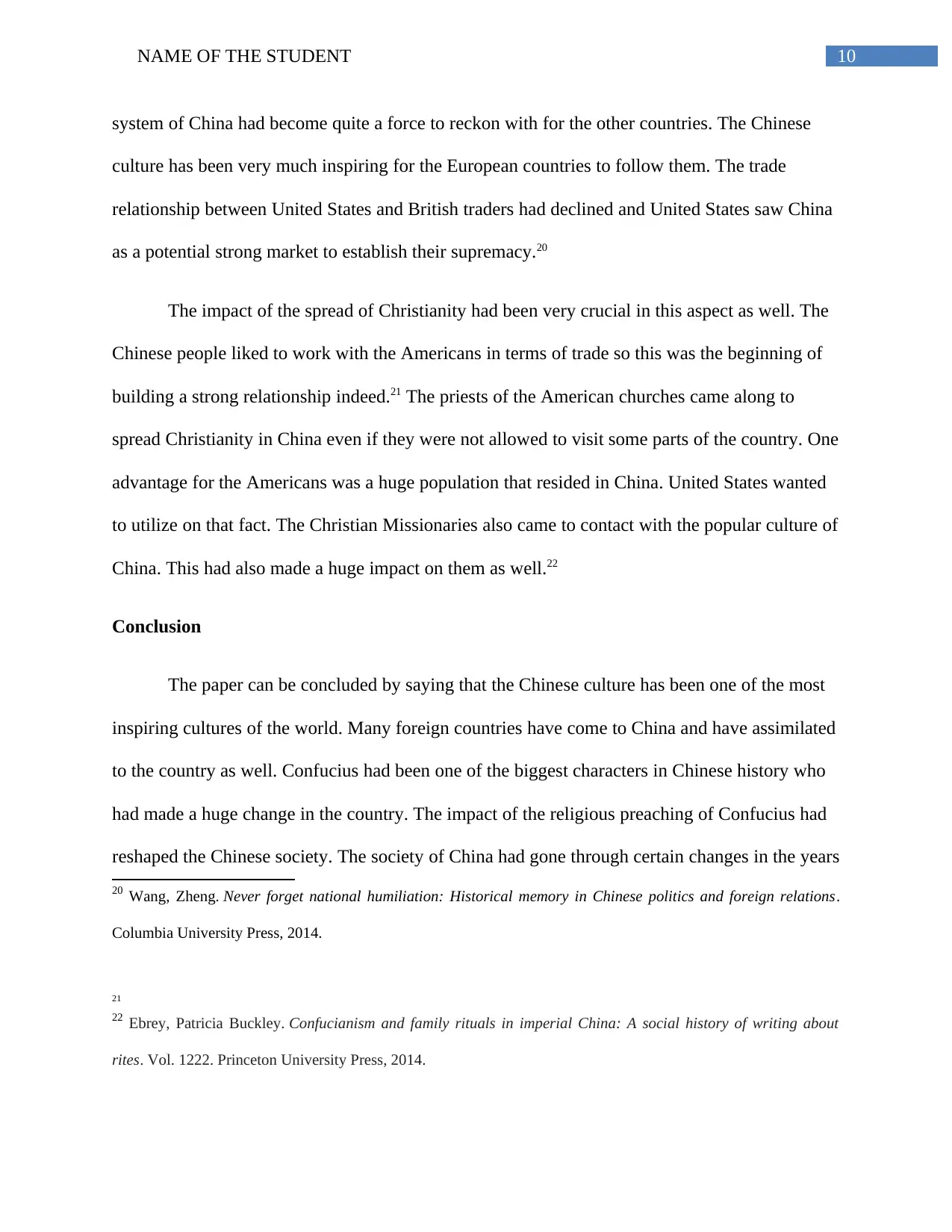
10NAME OF THE STUDENT
system of China had become quite a force to reckon with for the other countries. The Chinese
culture has been very much inspiring for the European countries to follow them. The trade
relationship between United States and British traders had declined and United States saw China
as a potential strong market to establish their supremacy.20
The impact of the spread of Christianity had been very crucial in this aspect as well. The
Chinese people liked to work with the Americans in terms of trade so this was the beginning of
building a strong relationship indeed.21 The priests of the American churches came along to
spread Christianity in China even if they were not allowed to visit some parts of the country. One
advantage for the Americans was a huge population that resided in China. United States wanted
to utilize on that fact. The Christian Missionaries also came to contact with the popular culture of
China. This had also made a huge impact on them as well.22
Conclusion
The paper can be concluded by saying that the Chinese culture has been one of the most
inspiring cultures of the world. Many foreign countries have come to China and have assimilated
to the country as well. Confucius had been one of the biggest characters in Chinese history who
had made a huge change in the country. The impact of the religious preaching of Confucius had
reshaped the Chinese society. The society of China had gone through certain changes in the years
20 Wang, Zheng. Never forget national humiliation: Historical memory in Chinese politics and foreign relations.
Columbia University Press, 2014.
21
22 Ebrey, Patricia Buckley. Confucianism and family rituals in imperial China: A social history of writing about
rites. Vol. 1222. Princeton University Press, 2014.
system of China had become quite a force to reckon with for the other countries. The Chinese
culture has been very much inspiring for the European countries to follow them. The trade
relationship between United States and British traders had declined and United States saw China
as a potential strong market to establish their supremacy.20
The impact of the spread of Christianity had been very crucial in this aspect as well. The
Chinese people liked to work with the Americans in terms of trade so this was the beginning of
building a strong relationship indeed.21 The priests of the American churches came along to
spread Christianity in China even if they were not allowed to visit some parts of the country. One
advantage for the Americans was a huge population that resided in China. United States wanted
to utilize on that fact. The Christian Missionaries also came to contact with the popular culture of
China. This had also made a huge impact on them as well.22
Conclusion
The paper can be concluded by saying that the Chinese culture has been one of the most
inspiring cultures of the world. Many foreign countries have come to China and have assimilated
to the country as well. Confucius had been one of the biggest characters in Chinese history who
had made a huge change in the country. The impact of the religious preaching of Confucius had
reshaped the Chinese society. The society of China had gone through certain changes in the years
20 Wang, Zheng. Never forget national humiliation: Historical memory in Chinese politics and foreign relations.
Columbia University Press, 2014.
21
22 Ebrey, Patricia Buckley. Confucianism and family rituals in imperial China: A social history of writing about
rites. Vol. 1222. Princeton University Press, 2014.
Secure Best Marks with AI Grader
Need help grading? Try our AI Grader for instant feedback on your assignments.
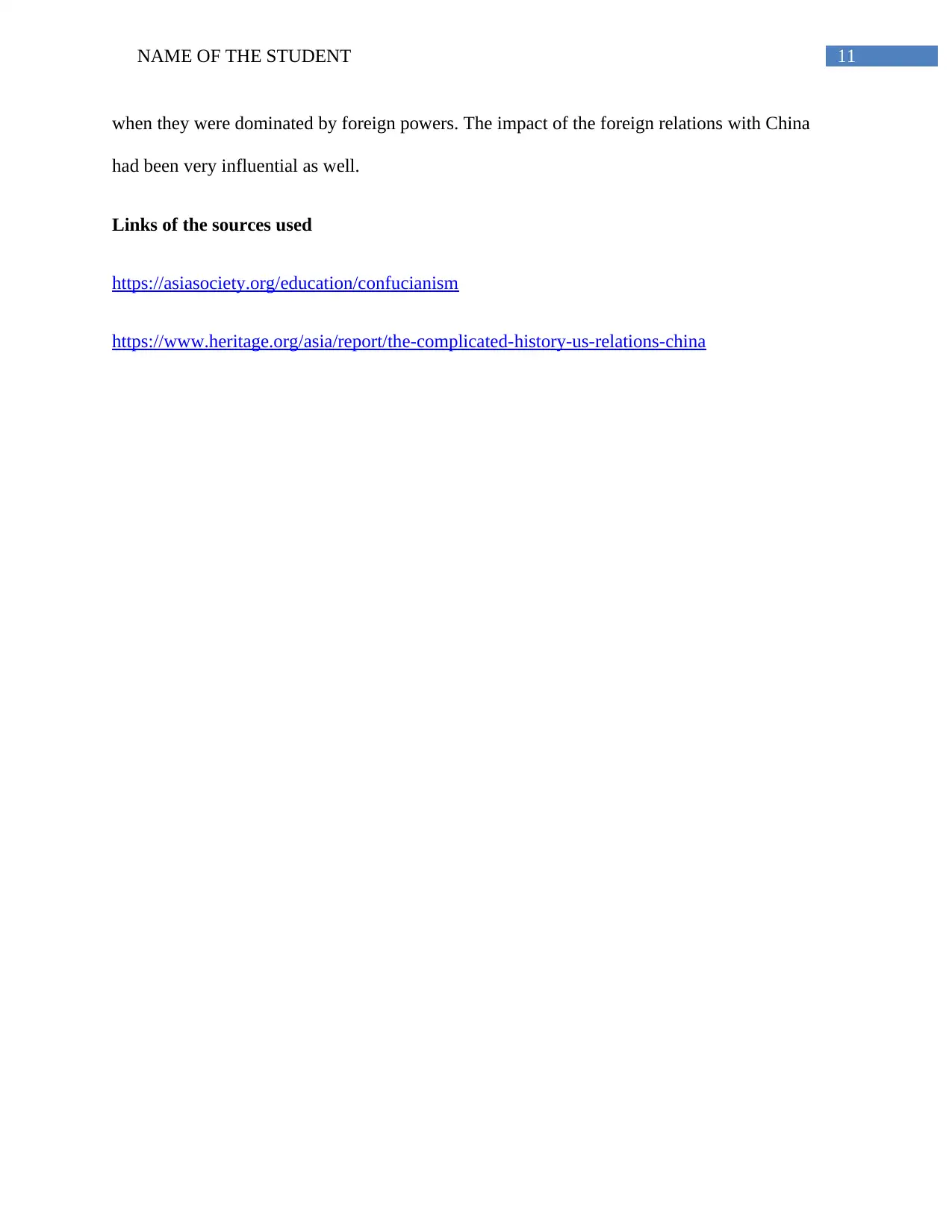
11NAME OF THE STUDENT
when they were dominated by foreign powers. The impact of the foreign relations with China
had been very influential as well.
Links of the sources used
https://asiasociety.org/education/confucianism
https://www.heritage.org/asia/report/the-complicated-history-us-relations-china
when they were dominated by foreign powers. The impact of the foreign relations with China
had been very influential as well.
Links of the sources used
https://asiasociety.org/education/confucianism
https://www.heritage.org/asia/report/the-complicated-history-us-relations-china
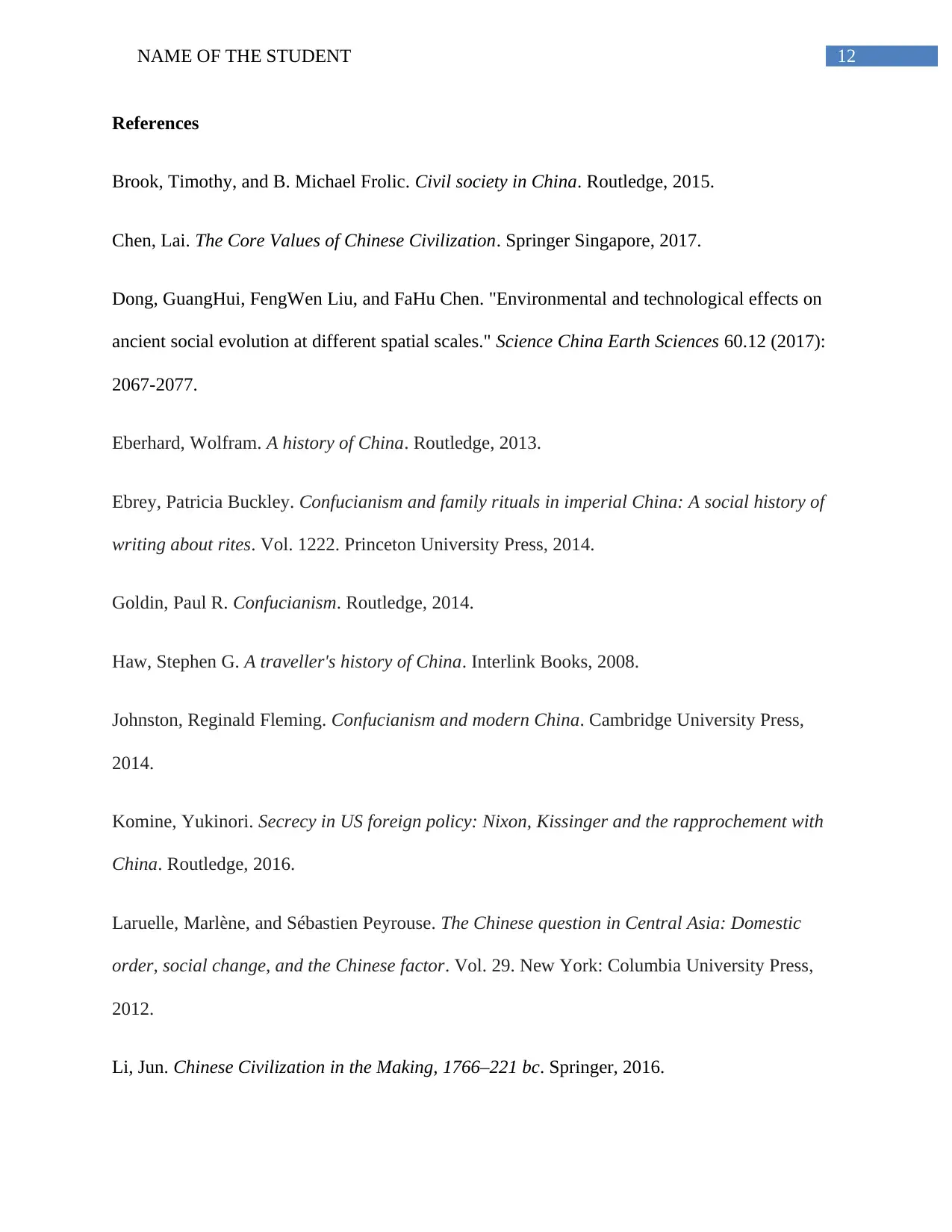
12NAME OF THE STUDENT
References
Brook, Timothy, and B. Michael Frolic. Civil society in China. Routledge, 2015.
Chen, Lai. The Core Values of Chinese Civilization. Springer Singapore, 2017.
Dong, GuangHui, FengWen Liu, and FaHu Chen. "Environmental and technological effects on
ancient social evolution at different spatial scales." Science China Earth Sciences 60.12 (2017):
2067-2077.
Eberhard, Wolfram. A history of China. Routledge, 2013.
Ebrey, Patricia Buckley. Confucianism and family rituals in imperial China: A social history of
writing about rites. Vol. 1222. Princeton University Press, 2014.
Goldin, Paul R. Confucianism. Routledge, 2014.
Haw, Stephen G. A traveller's history of China. Interlink Books, 2008.
Johnston, Reginald Fleming. Confucianism and modern China. Cambridge University Press,
2014.
Komine, Yukinori. Secrecy in US foreign policy: Nixon, Kissinger and the rapprochement with
China. Routledge, 2016.
Laruelle, Marlène, and Sébastien Peyrouse. The Chinese question in Central Asia: Domestic
order, social change, and the Chinese factor. Vol. 29. New York: Columbia University Press,
2012.
Li, Jun. Chinese Civilization in the Making, 1766–221 bc. Springer, 2016.
References
Brook, Timothy, and B. Michael Frolic. Civil society in China. Routledge, 2015.
Chen, Lai. The Core Values of Chinese Civilization. Springer Singapore, 2017.
Dong, GuangHui, FengWen Liu, and FaHu Chen. "Environmental and technological effects on
ancient social evolution at different spatial scales." Science China Earth Sciences 60.12 (2017):
2067-2077.
Eberhard, Wolfram. A history of China. Routledge, 2013.
Ebrey, Patricia Buckley. Confucianism and family rituals in imperial China: A social history of
writing about rites. Vol. 1222. Princeton University Press, 2014.
Goldin, Paul R. Confucianism. Routledge, 2014.
Haw, Stephen G. A traveller's history of China. Interlink Books, 2008.
Johnston, Reginald Fleming. Confucianism and modern China. Cambridge University Press,
2014.
Komine, Yukinori. Secrecy in US foreign policy: Nixon, Kissinger and the rapprochement with
China. Routledge, 2016.
Laruelle, Marlène, and Sébastien Peyrouse. The Chinese question in Central Asia: Domestic
order, social change, and the Chinese factor. Vol. 29. New York: Columbia University Press,
2012.
Li, Jun. Chinese Civilization in the Making, 1766–221 bc. Springer, 2016.
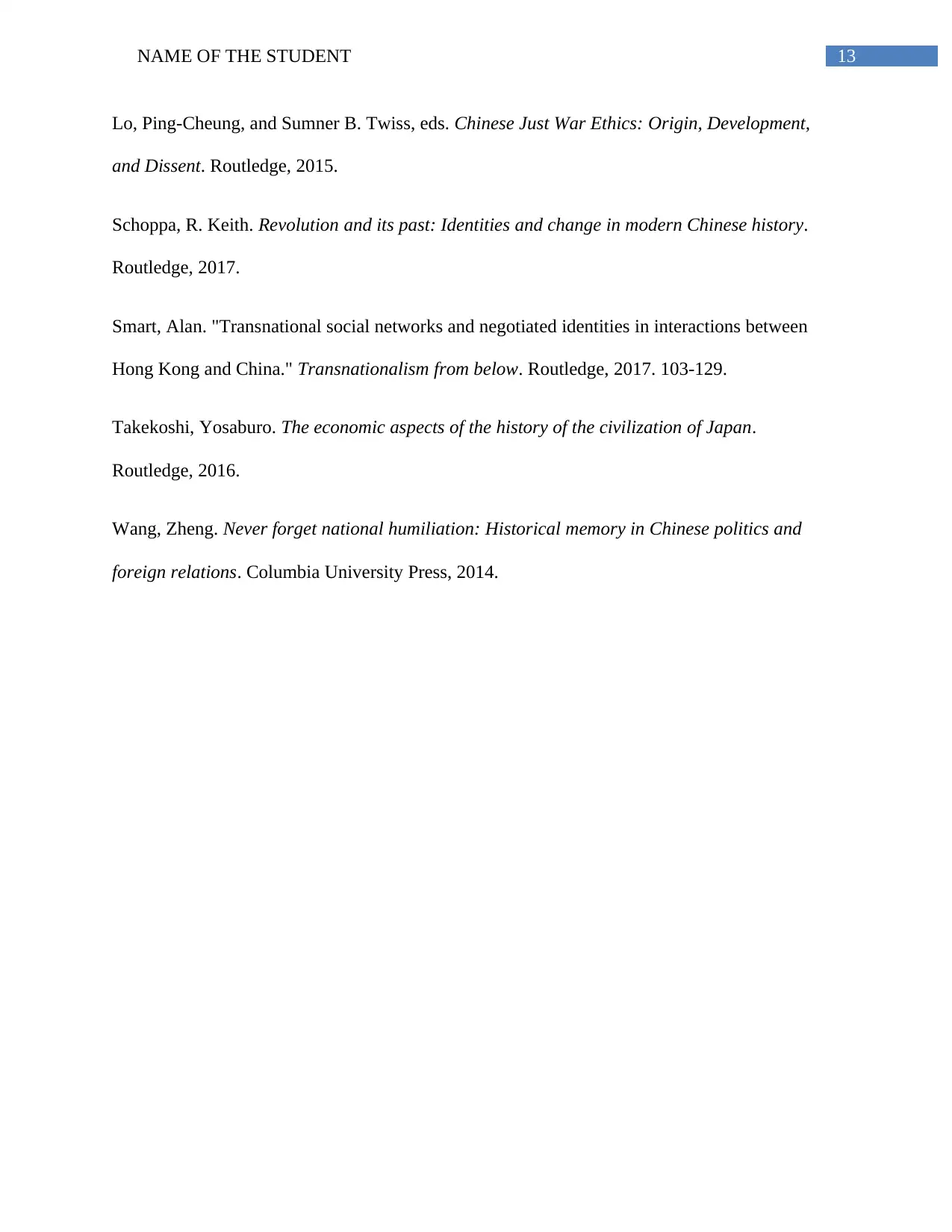
13NAME OF THE STUDENT
Lo, Ping-Cheung, and Sumner B. Twiss, eds. Chinese Just War Ethics: Origin, Development,
and Dissent. Routledge, 2015.
Schoppa, R. Keith. Revolution and its past: Identities and change in modern Chinese history.
Routledge, 2017.
Smart, Alan. "Transnational social networks and negotiated identities in interactions between
Hong Kong and China." Transnationalism from below. Routledge, 2017. 103-129.
Takekoshi, Yosaburo. The economic aspects of the history of the civilization of Japan.
Routledge, 2016.
Wang, Zheng. Never forget national humiliation: Historical memory in Chinese politics and
foreign relations. Columbia University Press, 2014.
Lo, Ping-Cheung, and Sumner B. Twiss, eds. Chinese Just War Ethics: Origin, Development,
and Dissent. Routledge, 2015.
Schoppa, R. Keith. Revolution and its past: Identities and change in modern Chinese history.
Routledge, 2017.
Smart, Alan. "Transnational social networks and negotiated identities in interactions between
Hong Kong and China." Transnationalism from below. Routledge, 2017. 103-129.
Takekoshi, Yosaburo. The economic aspects of the history of the civilization of Japan.
Routledge, 2016.
Wang, Zheng. Never forget national humiliation: Historical memory in Chinese politics and
foreign relations. Columbia University Press, 2014.
1 out of 13
Related Documents
Your All-in-One AI-Powered Toolkit for Academic Success.
+13062052269
info@desklib.com
Available 24*7 on WhatsApp / Email
![[object Object]](/_next/static/media/star-bottom.7253800d.svg)
Unlock your academic potential
© 2024 | Zucol Services PVT LTD | All rights reserved.




